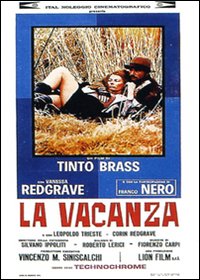La vacanza
La vacanza (The Vacation) is a term that can refer to various contexts, including its use in film, literature, and general discourse about holidays or vacations. In the absence of a specific context, this article will provide a general overview of the concept of vacation, highlighting its cultural and social significance, as well as its representation in various media.
Definition and Etymology[edit | edit source]
A vacation is a period of time that an individual or group takes off from their regular activities, such as work or school, for rest, leisure, or travel. The word "vacation" originates from the Latin vacatio, meaning freedom from occupation. Over time, the concept of taking a vacation has evolved from a luxury afforded by the wealthy to a widely accessible means of relaxation and recreation for people from various walks of life.
Cultural Significance[edit | edit source]
Vacations hold significant cultural value across the world, serving as a time for individuals and families to relax, explore new places, and spend time together away from the routines of daily life. The concept of vacation varies greatly from one culture to another, with differences in how it is spent, the duration, and the activities involved.
Representation in Media[edit | edit source]
Vacations have been a popular subject in film, literature, and other forms of media, often depicted as a time of adventure, self-discovery, or familial bonding. Films and books that center around vacations can range from comedic to dramatic, highlighting the various experiences and emotions associated with taking a break from the norm.
In Film[edit | edit source]
Films such as National Lampoon's Vacation series humorously explore the mishaps and adventures of a family on their road trip across America. On the other hand, movies like Eat Pray Love depict vacations as transformative journeys that lead to self-discovery and personal growth.
In Literature[edit | edit source]
Literature also offers a rich exploration of vacations, with novels such as On the Road by Jack Kerouac presenting a more introspective look at travel and the search for meaning. Children's books, like The Berenstain Bears and Too Much Vacation, often portray vacations from a familial perspective, emphasizing bonding and the experiences gained from spending time together.
Social and Psychological Benefits[edit | edit source]
Research has shown that taking vacations can have numerous benefits for mental and physical health. Vacations can reduce stress, improve mental health, enhance creativity, and increase overall happiness. They also provide an opportunity for people to engage in physical activities, explore new cultures, and develop new perspectives.
Conclusion[edit | edit source]
Vacations are an integral part of human culture, offering a break from the daily grind and an opportunity for relaxation, adventure, and personal growth. Whether depicted in media or experienced in real life, vacations represent a universal desire for exploration, rest, and quality time with loved ones.
Search WikiMD
Ad.Tired of being Overweight? Try W8MD's physician weight loss program.
Semaglutide (Ozempic / Wegovy and Tirzepatide (Mounjaro / Zepbound) available.
Advertise on WikiMD
|
WikiMD's Wellness Encyclopedia |
| Let Food Be Thy Medicine Medicine Thy Food - Hippocrates |
Translate this page: - East Asian
中文,
日本,
한국어,
South Asian
हिन्दी,
தமிழ்,
తెలుగు,
Urdu,
ಕನ್ನಡ,
Southeast Asian
Indonesian,
Vietnamese,
Thai,
မြန်မာဘာသာ,
বাংলা
European
español,
Deutsch,
français,
Greek,
português do Brasil,
polski,
română,
русский,
Nederlands,
norsk,
svenska,
suomi,
Italian
Middle Eastern & African
عربى,
Turkish,
Persian,
Hebrew,
Afrikaans,
isiZulu,
Kiswahili,
Other
Bulgarian,
Hungarian,
Czech,
Swedish,
മലയാളം,
मराठी,
ਪੰਜਾਬੀ,
ગુજરાતી,
Portuguese,
Ukrainian
Medical Disclaimer: WikiMD is not a substitute for professional medical advice. The information on WikiMD is provided as an information resource only, may be incorrect, outdated or misleading, and is not to be used or relied on for any diagnostic or treatment purposes. Please consult your health care provider before making any healthcare decisions or for guidance about a specific medical condition. WikiMD expressly disclaims responsibility, and shall have no liability, for any damages, loss, injury, or liability whatsoever suffered as a result of your reliance on the information contained in this site. By visiting this site you agree to the foregoing terms and conditions, which may from time to time be changed or supplemented by WikiMD. If you do not agree to the foregoing terms and conditions, you should not enter or use this site. See full disclaimer.
Credits:Most images are courtesy of Wikimedia commons, and templates, categories Wikipedia, licensed under CC BY SA or similar.
Contributors: Prab R. Tumpati, MD

